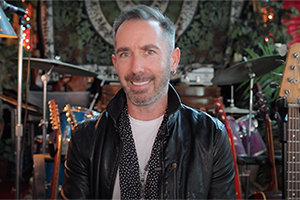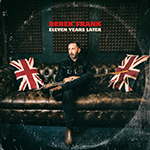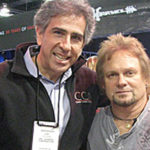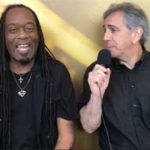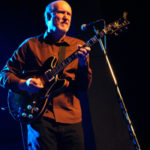Gwen Stefani/Shania Twain bassist on balancing superstar gigs and new solo release.
Exclusive interview with FBPO’s Jon Liebman
November 9, 2020
It’s not easy to make a name for yourself in the Los Angeles music scene. But since getting his start in the late ’90s, Derek Frank has managed to establish himself as a top-tier session bassist there. He’s also become an in-demand touring musician, who currently works with both Gwen Stefani and Shania Twain. Over the years, the bassist has worked with artists like Shakira, Demi Lovato, Air Supply and Christina Aguilera, and he’s performed on television shows like Ellen, Dancing with the Stars and The Tonight Show with Jimmy Fallon. Beyond that, Frank has produced two solo albums, including his latest effort, Eleven Years Later, which was released September 18.
FBPO: Tell me about your musical upbringing and how you became a bass player.
DF: I was always just a fan of music. My dad had some eight tracks and stuff when I was growing up. I remember the first one I listened to was Queen, News of the World. And of course I just loved “We Will Rock You.” I think that just injected the idea of music into me, and I was just into it. When MTV came out, I was fixated on it. I’d watch MTV for hours a day, just thinking that one day I wanted to do that.
FBPO: Sounds like a cool dad too.
DF: Yeah, for sure. We went to some concerts. I think the first concert I saw was Shaun Cassidy.
FBPO: Never mind. Not cool! [Laughs]
DF: [Laughs] My sister was a big fan. And then we saw Sha Na Na, we saw the Beach Boys, so I was just interested in it at an early age. Eventually, I got a Strat copy guitar and took some guitar lessons. I was playing for a few months, taking lessons at the local music store. One day, I was waiting for my guitar lesson, and there was a bass on the wall. And I was like, “What’s that?” And it was big, and it had four strings. And I didn’t know what that was. And the salesman said, “Oh, that’s a bass guitar.” I was like, “I want to check that out.” So he took it off the wall and I played it. And it was just immediately, “Yep! This is my instrument.”
FBPO: About how old were you at the time?
DF: I was probably about 13 or 14. I think I bought my first bass in between eighth and ninth grade. During the summer I was a caddy at the golf course and saved some money and bought my first bass.
FBPO: You saw the bass, checked it out, and there was no turning back, huh?
DF: Yeah. It was just one of those things where I just knew, that was my instrument. I don’t think I ever really connected with guitar. And I think just as soon as I started playing bass, I said, “Oh yeah, this is my instrument.”
FBPO: Did you start listening to music differently once you discovered the bass?
DF: Yeah. I think once I figured out what a bass was, what it sounded like and what its function was in the band, I was able to listen to music and pick it out and know what the bass was. When I was younger, I would listen to music but didn’t really know what all was going on and who was playing what.
FBPO: Who were you bass influences?
DF: Early on, I was really into classic rock and listened to a lot of Van Halen. I was really into Michael Anthony. That got me into Led Zeppelin, John Paul Jones. I was so into them. Beatles, all that stuff. I was playing in a high school garage band. We would jam on those tunes and we probably sucked!
FBPO: How did your career get rolling? What kind of stuff were you doing initially?
DF: I’d say the first gigs, first actual paying gigs, were when I was in Cleveland. I was in high school there, and the high school didn’t really have any bass players in the music program, and they needed somebody for jazz band. They didn’t have enough tubas, so they needed some low end in concert band and marching band, so I did that. I played in the pit orchestra for all the musicals, so I got thrust into that.
FBPO: Electric bass, right?
DF: Yeah. It was all electric. I hadn’t really touched the upright yet. Even in marching band, I was playing electric bass. I didn’t want to play tuba so I said, “Well, I’ll play if I can play bass.” So my band director got a wireless and a generator for the amp, he put the amp on the sideline, and I’d march around playing bass.
FBPO: Sounds like fun!
DF: Yeah. There’s no video of it, unfortunately. So I was doing all this stuff at the school and that led me to join this all state jazz band. It was called Ohio Jazz Workers for Youth. My band director told me about it and told me I should go audition for it, so I auditioned and I got the gig. And from that we formed our own little quintet and we started gigging. We had a regular gig at a club down in University Circle where, at the time, they had a few jazz clubs. They had the Boarding House. I remember that place. Isabella’s. We played at a place called Brandywine, which was like a restaurant jazz club. So those were my gigs. I was about 16, and we’d just do little jazz gigs around town. Then I started to get called for some musicals and things like that. So that was my intro to playing professionally.
FBPO: How did you break into the LA music scene? Was that as easy as you made it look?
DF: [Laughs] It’s never easy, even now that I’ve been there 23 years. It’s especially not easy now that there’s no gigs. But, you know.
FBPO: Yeah.
DF: I went to LA shortly after college. I took a brief detour to go to Boston. There was a girl involved, blah, blah, blah. That didn’t work out. I moved to LA. I didn’t intend on staying in LA. I was going to go to San Francisco. I had some friends that were living there playing jazz. And they were making a living, and I was going to do that. But my parents had moved to LA while I was in college in Miami, and I had never really checked it out. I’d been there on spring break and Christmas break and things like that, but hadn’t really checked out LA. It really wasn’t on my radar as a place to start my career, oddly enough. When I got to LA, my plan was to stay with my parents for the summer, get a day job, save some money, reset and then go to San Fran. But within a couple of weeks, some of my friends from college were calling me for gigs. And it was apparent after a couple of weeks that there was no reason to go anywhere else. That was ’97, and I’ve been there over 23 years now.
FBPO: How do you manage to straddle your gigs with Gwen Stefani and Shania Twain? There’s got to be a conflict somewhere along the way.
DF: No, the planets aligned on that one. I first joined Shania’s band in 2015 and we did a big tour that year. The next year she was working on Now, so I worked with some other people. I signed on with Air Supply for a little over a year here, then I went back to Shania in 2017. Then in 2018, Shania didn’t need me. She did a tour, it was a scaled down thing. It was a smaller band and there was no bass player. So when I got called for Gwen, so I was available. How can you say no to that? She was doing a Vegas residency, so I signed on with Gwen for that. We were about a year and-a-half into her Vegas residency, and I started seeing Shania show up at some of the shows. She was scoping out the theater to do her own residency in the same theater. Sure enough, a couple of months later, she announced that she’s going to do her residency the same theater, the Zappos Theater in Vegas. I got a call to sign on with her for that residency. And the cool thing was, they’re in the same venue. They rotate so there wouldn’t be any conflict. So it was a very lucky situation that I was able to juggle both Gwen and Shania with very few conflicts. Gwen does some other stuff, some touring and some festivals and corporates and things like that, so there were going to be a couple of conflicts on the horizon, but that all ended up getting canceled anyway due to COVID. So, so far, I’ve been able, luckily enough, to juggle both gigs.
FBPO: COVID notwithstanding, it doesn’t get any luckier than that. That’s amazing.
DF: Yeah. I felt very fortunate. I’m really looking forward to when we can get back to work. I love both artists and I love both bands. I wouldn’t want to give one up though. I’m lucky that I’m in a situation where I don’t have to give one up.
FBPO: Do you sing, or do you just play bass in either of those?
DF: I sing on both gigs. When I first joined Shania’s band is when I really started working on my vocals. It was one of those things that I just didn’t dig into it too much in my early years. And once I got Shania’s gig and I started looking at some of the YouTube videos of her old band and stuff, it was apparent that singing was a big part of the gig, so I worked really hard to get that together. I took some vocal lessons, I did some audio courses, just worked really hard to get that together. Now I sing a lot with Shania and a bunch with Gwen as well.
FBPO: Let’s talk about the big news, your new record, Eleven Years Later. I figured out where the title came from, because your first album, Let The Games Begin, came out in 2009.
DF: 2009.
FBPO: Which was 11 years ago.
DF: So 11 years later, here we are!
FBPO: What inspired the new record? Was there an underlying message you wanted to get across?
DF: After I did my first record, I took some time away from recording. I was gigging with my own band for a while and I just got burnt on that. I was also busy playing with different artists. I’d been doing a lot of touring over the years and the idea of doing more solo stuff just got put on the back burner. Then last year sometime, 2019, I just started thinking about it again. It’s been a while. It’s been 10 years since I’ve done a record. I should start working on something. But again, I was busy. I was juggling Gwen and Shania and some other stuff and it just couldn’t really fit it into the schedule. Then COVID hit, and I was in Vegas with Shania and we got shut down. So I came home, and I was just thinking, “Well, what do I do now?” I was like, “Okay, well, I don’t know how long this is going to last and maybe now’s the time to start writing a solo album.” I just started working really hard. The day after I got home, I started writing and coming up with the concept for the album and got it together pretty quickly.
FBPO: How would you describe the concept for the album?
DF: It’s definitely eclectic. Instrumental groove music with ‘70s undertones is how I can describe it. I wanted it to be old school and vintage sounding without being a goofy caricature of ‘70s music. It’s got a ‘70s vibe. Everything was recorded analog. It’s just groovy. It’s instrumental. Influences go from Meters, to John Scofield, to Medeski Martin & Wood, to bands like Dumpstaphunk, maybe a little Thundercat.
FBPO: I can’t tell you how many bass players have said to me, “I want to make a solo album, but it’s not going to be ‘one of those bass records.’” You’ve actually succeeded in making a great record with great bass playing, and it’s not ‘one of those bass records.’ So, congratulations!
DF: Well, thank you! I didn’t want to do a bass album because first of all, I’m not really that kind of player. I’m a group player with some solo chops, but I’m not one of those ripping solo guys. There are so many guys out there that do that way better than I do, so I didn’t want that to be the vibe of the record. Plus, I feel like when you’re doing that, you’re really narrowing down your audience. There are very few people that are into that kind of stuff. And, as you put it, I honestly don’t listen to a lot of those records. It’s just not really what turns me on. What turns me on musically is just fat tone, fat groove, good interaction between players and just — yeah, taste!
FBPO: There are a few covers on the record. What about the rest of the tunes? Did you write them yourself?
DF: There are three covers on it. Everything else is original. I did a cover of a Meters song called “Give It What You Can,” originally done by Sam & Dave, but I was hipper to the Meters version of it, which came out a couple of years later, around ’74, I think. So that’s a cover. We covered Iron Maiden’s “The Trooper,” because I’m a big Iron Maiden fan. I wanted to try to figure out how to cover an Iron Maiden song in a kind of a groove, organ, quartet setting. And then “All Day Sucker,” the Stevie Wonder song that I did back in 2014 and it never found a home on a record, so I figured for this one, even though I did it years ago, it’d be fun to put it on the record as a bonus track.
FBPO: Let’s talk about your gear. What are you playing?
DF: Cool. Well, for the record, I kept it pretty simple. Most of the songs were done on my ’63 P bass with La Bella Low Tension, flatwound strings. I used a NordyMute, Carey Nordstrand’s old mute. I use that on a few songs. I also have a La Bella Olinto P bass, and I played that with roundwounds. Those basses were used on the bulk of the album. I have a Celinder J Update, which is like an active jazz bass. I played that on the Stevie Wonder cover, “All Day Sucker.” And also there’s a song, “Hunker Down,” where there are a couple of little bass solo bridges that I used that bass for. And then I have a ’76 P bass that I used for the wah-wah bass parts in “Get ‘Em.” That bass is just real comfortable to play for doing that up/down thumb thing. It’s just, I like playing that bass. So, four basses total on the record.
FBPO: You play La Bella strings on all of them?
DF: I do, yeah. I’ve got the RX Stainless strings, for when I’m using rounds and then the Low Tension flats when I’m using flats.
FBPO: How about amps and effects?
DF: For that album, I used a Noble 2 pre-amp as my DI. It’s a two-pre-amped DI. So that was my direct signal. And then for the amp — Jim Scott is producer on the record — he had a ‘70s B-15 there. I’ve got a ‘60s B-15. I thought about bringing it, but I knew Jim was used to miking his amps. So I was just like, “Oh, I’ll just see how yours sounds.” So I used his ‘70s B-15 and we miked it with a Shure SM7, an older one. And then that went through a Neve 1081 pre and 254 compressor that was with Jim’s stuff in the studio. So that was the single-chain for the record. Pretty much 50/50 split between DI and amp. So that was a single-chain pedal I used. I’ve got a handful of MXR pedals. I’ve got the Phase 95, which I love. And the Vintage Bass Octave, which is their new little mini bass octave. So I used that with the drive setting turned off to get that little sucky, classic OC-2 vibe. I used a Dunlop Cry Baby Bass Wah, a Cali76 compressor. I used a Moollon Bass Drive and a Darkglass Vintage Microtubes. Those all got used on the record.
FBPO: What about when playing live?
DF: On my gigs, I use some different stuff. On the record, I wanted that old school P bass vibe with a few effects. On my gigs with Gwen and Shania, I’ve used a Kemper Profiler with the Radial JDI because all our amps are off stage. We have nothing on stage. All the patch changes are done through MIDI. I’ve got different settings for each bass. With Gwen, I’ve got a bunch of effects, which are great in the Kemper, so I use those. I use Aguilar stuff when I can actually have an amp on stage. Love the Aguilar stuff!
FBPO: How about the future?
DF: That’s interesting. If you asked me two months ago, I would say do another solo album, which I just did. I really enjoyed the process of making that album. And I forgot how satisfying it is to make a record of your own because I had stepped away from it for so long. I want to start doing gigs with my band. I want to start playing the music live, writing more music. I would like to do maybe an EP a year. I’ve got a couple ideas, stylistic ideas, for some EPs I’d like to do. I think rather than doing another eleven-song record, maybe do a few five-song EPs. I’ve got a couple ideas for those that I would like to get into next year. And then, when the world gets back to normal, I’m just really looking forward to jumping back in with Gwen and Shania, getting back to our Vegas residencies, getting back to doing some touring. I enjoy that so much. I enjoy touring and I enjoy playing live so much that I want to keep doing that for as long as I can.
FBPO: I’ve been threatening to make a record for years. I’ve got a lot of material. You inspire me!
DF: I highly recommend it. The one thing that maybe was holding me back and is maybe holding some other people back is just the fact that recorded music is just so hard to monetize these days. So you can look at it, “Oh, I’m going to spend this much on this record, but how much do I actually stand to make on it?” And for me, I just had to let go of that and be like, “You know what? I’m not making this record to make money. I’m making it for myself for my own artistic satisfaction, to satisfy my soul.” And I think that’s the best reason to make a record. Because just the way the music business is these days, it’s so hard to make any money. You can sell a few copies, if you go here and there. But most people are just going to stream or check it out on YouTube. You just have to let go of that and just be like, “You know what? I’m going to make this for me and just to inspire people. And if I can make a bit of money, cool.” But you can’t really make that the driving force behind it.
FBPO: What would you be, if you weren’t a bass player?
DF: That’s a tough one because, damn, for the last seven months, I’ve had to figure that out. I’m still a bass player, but I’m not doing what I normally do, so I’ve had to think about that. Honestly, I think I’d do something that has to do with the outdoors. I may just become a snowboard instructor. I love nature, I love the outdoors, I love snowboarding. I’d be happy doing that. Something would be missing from my life, as it has been for the past seven months, but if playing bass was not an option, I would just have to do something that kept me outdoors.
Eleven Years Later is available here:
See Jon’s blog, with key takeaways from this interview here.
